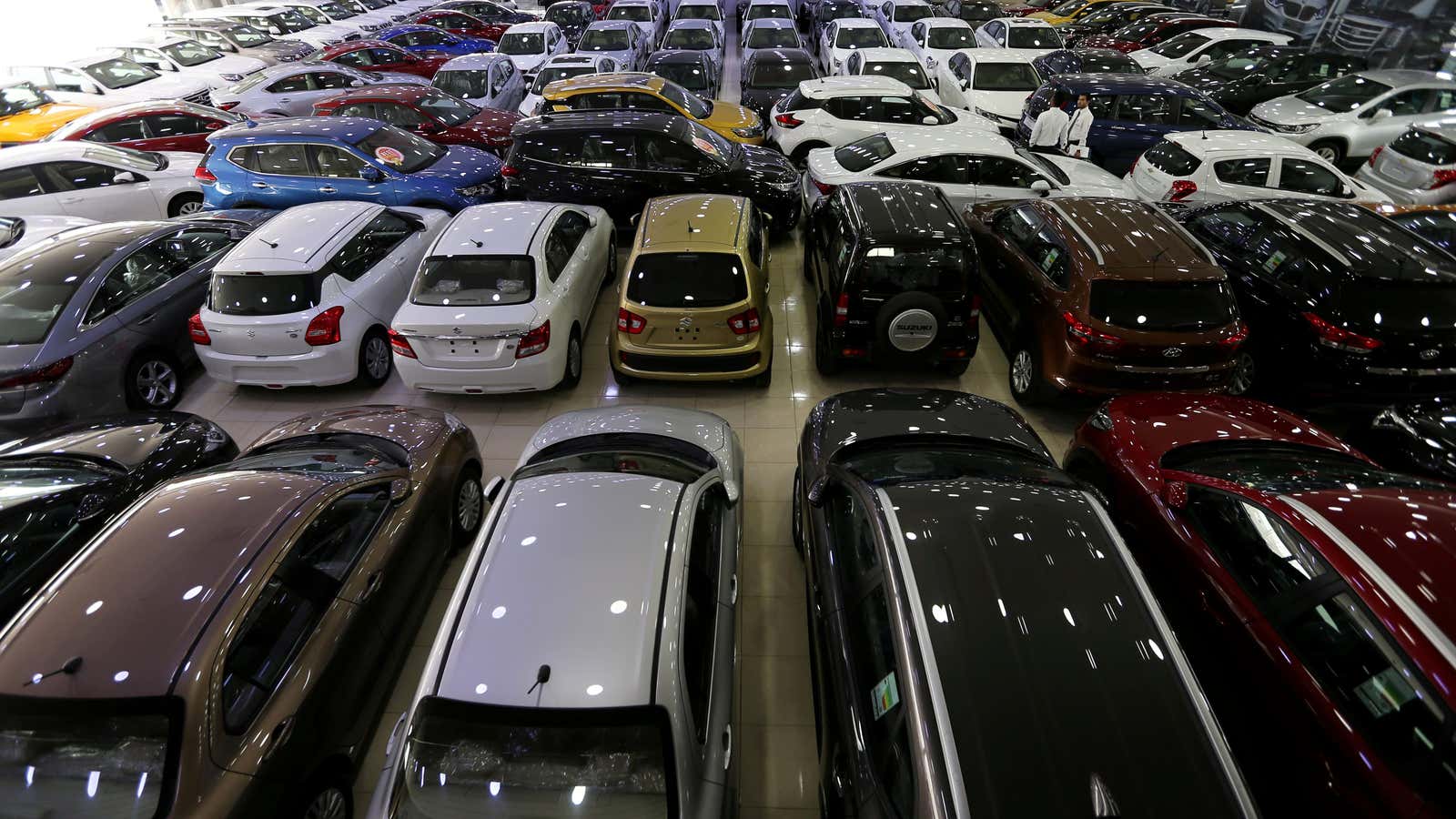Nitin Kumar, a young automobile salesman in South Delhi’s Lajpat Nagar, isn’t having the best of days at work.
Customer footfall at his showroom, which sells Indian carmaker Mahindra & Mahindra’s (M&M) vehicles, has fallen in the recent times.
“The situation has worsened in the past six months,” Kumar said. “Earlier, 60-70% of customers who made enquiries through phone calls and other channels, used to visit the showroom. This has now gone down to 10-20%.”
Falling footfalls and poor sales at Kumar’s showroom is not a one-off instance.
India’s automobile sector is witnessing its worst-ever slowdown. In May, passenger vehicle sales in the country fell 20.55% year-on-year to 239,347 units. It was the steepest drop in nearly 18 years, according to data released by industry body Society of Indian Automobile Manufacturers (SIAM).
Several major automakers are being forced to cut production as inventory piles up.
Mahindra Vehicle Manufacturers, an arm of M&M, informed the stock exchanges (pdf) on June 8 that it would be observing “no production days ranging between 5–13 days” in the April-June quarter as part of “aligning its production with sales requirements.”
Market leader Maruti Suzuki will also shut its plants between June 23 and June 30 to curb the rise in unsold vehicles.
What caused the downturn?
A host of factors has brought India’s automobile industry, the world’s fourth largest by sales, to this sorry state.
First, the Indian economy is going through a slump. The country’s gross domestic product (GDP) (growth) fell from 7.2% in financial year 2018 to 6.8% in financial year 2019, data from Central Statistics Office showed. This has resulted in cautious consumer spending.
Second, automakers are struggling to comply with the government’s new policies, including a total ban on polluting petrol and diesel vehicles, forcing them to discontinue some old models. The government think tank Niti Aayog has recommended that only electric vehicles be sold in the country after 2030.
Besides, the Bharat VI emission standards are set to kick in from April 2020, forcing brands like Maruti Suzuki to remove diesel cars from their portfolio from next year.
“Customers know buying diesel cars will no longer be fruitful, and we cannot convince them otherwise. Petrol variants can still find buyers, but diesel ones continue to wait,” said a Maruti salesperson from East Delhi’s Preet Vihar showroom, who did not wish to be named.
Hope for better tomorrow
Some, though, see the weak sales as just a passing phase.
“The scorching heat and a lack of festive flavour in May, June, and July are the primary reasons for customers losing interest in buying. Besides, more than a month-long general election in May has added to the woes,” Shadaan Qureshi, Maruti Suzuki’s senior regional manager in Noida, told Quartz.
Consumers tend to put off vehicle purchases during the election season hoping that the new government will dole out some benefits in its general budget. The second Narendra Modi government, which came to power on May 26 this year, is scheduled to present its first budget on July 5.
Qureshi also adds that his brand is in a better position than most others. “In Noida itself, we have seen more than three showrooms of various brands being shut down. Maruti, too, experienced a decline but with wedding season around the corner, we expect the consumers to come back.”
Qureshi was referring to showrooms in remote parts of Noida that shuttered a few months ago.
New launches
The hope that sales will soon turn the corner has prompted some carmakers to announce new models.
For instance, South Korean auto giant Hyundai’s maiden sports utility vehicle (SUV), Venue, is moving the needle in at least some showrooms in the Delhi National Capital Region.
Launched less than a month ago, the compact SUV is in high demand due to its competitive price—starting Rs6.5 lakh ($9,300) in the capital—and has a waiting period of over two months.
“Our salespersons are busy dealing with customers who want to book Venue irrespective of the long waiting period. We have received over 15,000 bookings even before the pricing was revealed on May 21,” said Ankur Gupta, team leader at Hyundai’s Dilshad Garden showroom in East Delhi. “If it weren’t be for Venue, we, too, would have been dealing with low sales.”
